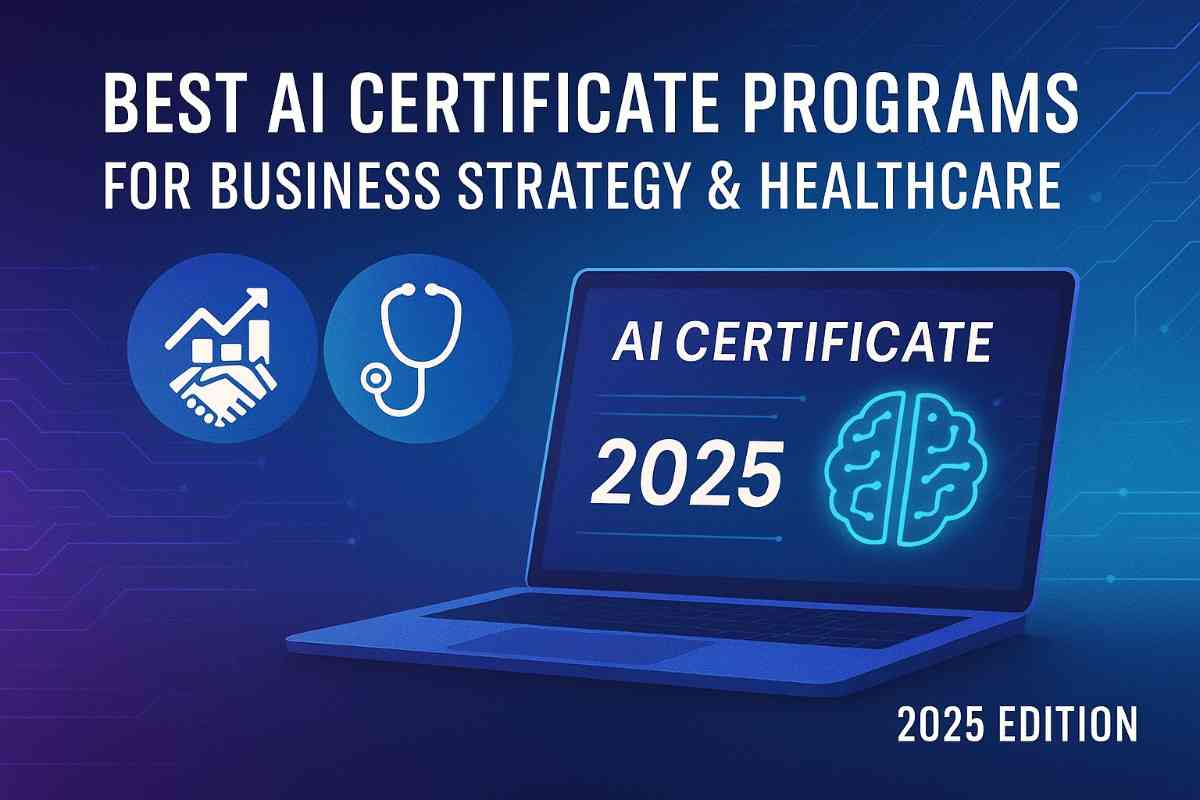Best AI Certificate Programs for Business Strategy & Healthcare (2025 Edition)
Artificial Intelligence has moved well beyond hype. Today, it’s influencing boardroom decisions, patient treatments, and entire organizational strategies. If you want to stay relevant, it’s not enough to know AI – you need to apply it wisely in your domain.
In this listicle, we compare some of the top certificate programs for artificial intelligence for business and artificial intelligence in healthcare, highlighting how Johns Hopkins University’s offerings stack up against other prominent institutions. By the end, you’ll see which paths might best match your goals (and background).
Best AI Certificate Programs for Business Strategy & Healthcare
1. Johns Hopkins University – Artificial Intelligence for Business
Let’s begin with how AI intersects with business strategy. JHU’s Artificial Intelligence for Business certificate bridges the gap between technical possibility and business reality. It’s designed for managers, consultants, or leaders who want to adopt AI – without necessarily coding every model themselves.
What makes it appealing:
- Live masterclasses taught by JHU faculty.
- Curriculum that blends AI foundations with strategic case studies, generative AI, and leadership skills.
- Support structure: peer groups, dedicated program manager, guided discussions.
Other programs offer overlapping value, but with different tradeoffs.
How it compares:
- MIT Sloan has “AI: Implications for Business Strategy,” which is excellent, but often shorter and pricier, targeting senior executives.
- Harvard Executive Education packages AI modules into broader transformation courses – but doesn’t always offer a concentrated certificate.
- Stanford Online emphasizes innovation-driven applications, great for tech founders but less intuitive for business leaders in non-tech industries.
If you value balance – rigorous but accessible, strategic but grounded – the JHU business certificate is hard to beat.
2. MIT Sloan – AI Strategy & Business Transformation
MIT’s program is a heavyweight when it comes to brand and rigor. Participants get deep exposure to how AI changes traditional business models and how organizations can navigate that change.
Strengths: Credibility, exposure to cutting-edge research, strong peer cohort
Tradeoffs: Higher cost, demands more prior leadership experience
It’s ideal if you’re already in senior leadership and want to lead AI-driven transformation at scale.
3. Johns Hopkins University – Artificial Intelligence in Healthcare
Switching to the health domain now: JHU’s Artificial Intelligence in Healthcare certificate is designed for clinicians, administrators, health-tech professionals, and policy makers who want to bring AI into real-world medical settings.
Why it stands out:
- Over 8 industry-aligned case studies focused on diagnostics, patient monitoring, predictive models, and clinical workflows.
- Ethical, regulatory, and adoption challenges are deeply addressed (not just the “cool tech” side).
- Flexible format: recorded lectures, live mentoring, guided project work.
How does that compare with other health-AI programs?
- MIT Sloan – Artificial Intelligence in Healthcare executive education: it gives solid strategic frameworks for AI in clinical and operational settings.
- Stanford Medicine offers technical deep dives into algorithms, research, and medical AI – but sometimes with steep math prerequisites.
- Coursera / edX partnerships deliver accessible healthcare AI modules, but often lack the immersive structure and credential weight that a JHU certificate brings.
If you want both domain relevance and project-ready skills, JHU’s healthcare track is very competitive.
4. Stanford University – Innovation in Health & AI
Stanford is known for pushing boundaries. Their AI-health programs bring you into bleeding-edge research: algorithm design, medical imaging pipelines, and model interpretability.
Pros: Strong research credentials, access to top faculty, high technical depth
Cons: Can be too technical for administrators, and you may miss the strategic / policy side of healthcare AI
For those aiming for research or technical leadership in health AI, Stanford is a great fit. For balance between strategy and application, JHU has the edge.
5. Harvard University – Executive AI Programs
Harvard tends to embed AI topics into its broader executive education tracks. You’ll find sessions on AI transformation, digital disruption, or health systems innovation.
Pros: Prestige, networking, exposure to cross-industry leaders
Cons: Shorter time frames, less specialization, and sometimes limited depth on domain-specific AI
If you’re looking for a taste of AI’s impact across sectors, Harvard delivers. But if you want a strong foundation you can build on, a dedicated certificate (like JHU’s) may give more.
6. Online Platforms: Coursera, edX & AI Specializations
Not everyone can commit to full certificates from top universities – and that’s where MOOCs shine. Platforms like Coursera and edX host AI programs from universities such as Google, University of Michigan, and HarvardX.
Advantages: Low cost, flexibility, accessible for beginners
Limitations: Less prestige, fewer networking opportunities, and often lighter project work
Use these as stepping stones: get comfortable, see what AI feels like in practice – then upgrade to formal certificates if you want deeper impact.
Final Thoughts
Artificial intelligence isn’t a tomorrow problem – it’s here now. Whether your focus is pushing business boundaries or improving patient care, the right learning path makes a difference.
- If you’re exploring artificial intelligence for business, JHU’s program offers grounded strategic insights and real-world application.
- If you’re working in health systems or medical fields, their artificial intelligence in healthcare certificate brings discipline-specific context and project-based learning.
Yes, MIT, Stanford, Harvard, and online platforms also offer strong options – but JHU’s two tracks offer a balance many professionals are seeking: strategic depth, domain relevance, and practical impact.





